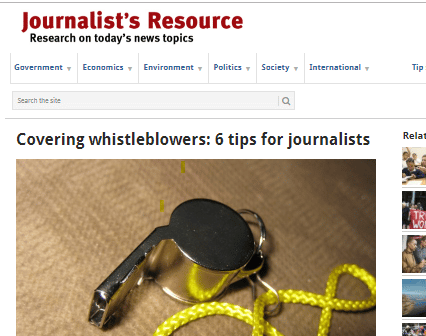Every journalist who has ever worked with a whistleblower knows these are fraught relationships. The journalist wants the story. The whistleblower wants justice. Or, maybe revenge. Whistleblowers can be heroic, brilliant, paranoid or deceptive. Journalists can push for too hard for information that may not be in the interest of the whistleblower to share. Or, somebody makes a misstep and the whistleblower is exposed.
Still, the stories they produce are sometimes the best way to right a wrong. So, the NWC was happy to produce a list of tips for journalists working with whistleblowers. We also contributed to a compilation put together by the Journalist’s Resource, a Harvard project that aims to connect reporters with reliable sources of information.
 For more on this topic, check out the upcoming Double Exposure film festival and symposium. A session on whistleblowing features Theranos whistleblower Erika Cheung.
For more on this topic, check out the upcoming Double Exposure film festival and symposium. A session on whistleblowing features Theranos whistleblower Erika Cheung.
The stakes are rising for whistleblowers across the globe. In the United States, whistleblowers are facing prosecution under the Espionage Act like never before, a charge that carries a potential life sentence for speaking up to expose wrongdoing. Elsewhere, whistleblowers face financial and professional ruin, smear campaigns and–in some countries–targeted assassination. What does this mean for the watchdogs in print and film?
Another session, called “The Undertow,” offers this.
Filmmakers and journalists working in the investigative mode often face great risks — personally, legally, monetarily, even bodily — to expose hidden corruption or bring clarity to a profoundly complex issue. Largely, the threats remain invisible to audiences and readers. The full influence of threat and danger, however, often go beyond the concrete steps practitioners take to work safely and reduce risk. Danger can also shape the investigative process, impinge on the storytelling that results, and continue to stalk sources and subjects, long after the credits have rolled. Nanfu Wang’s Peabody Award-winning documentary, Hooligan Sparrow followed Chinese activist Ye Haiyan as she faces government surveillance and harassment after advocating for sexually abused schoolgirls, while her newest film, One Child Nation, explores the profound effects of government policy on generations of Chinese parents and children. Ramona Diaz, who may be best known for her compelling character-driven documentaries, most notably of Philippine first lady Imelda Marcos, is now at work on a new film examining disinformation. Andalusia Knoll Soloff, a multimedia journalist based in Mexico City, traces the opioid epidemic in the U.S. to the poppy fields in Mexico, and trains her lens on the fragile ecosystem between migrant farmers, local drug lords, and the great consumer up north.




